- Home
- Samuel Beckett
Three Novels Page 24
Three Novels Read online
Page 24
Wearing over his long shirt a great striped cloak reaching down to his ankles Macmann took the air in all weathers, from morning to night. And more than once they had been obliged to go out looking for him with lanterns, to bring him back to his cell, for he had remained deaf to the call of the bell and to the shouts and threats first of Lemuel, then of the other keepers. Then the keepers, in their white clothes, armed with sticks and lanterns, spread out from the buildings and beat the thickets, the copses and the fern-brakes, calling the fugitive by name and threatening him with the direst reprisals if he did not surrender immediately. But they finally remarked that he hid, when he did, always in the same place and that such a deployment of force was unnecessary. From then on it was Lemuel who went out alone, in silence, as always when he knew what he had to do, straight to the bush in which Macmann had made his lair, whenever this was necessary. My God. And often the two of them remained there for some time, in the bush, before going in, huddled together, for the lair was small, saying nothing, perhaps listening to the noises of the night, the owls, the wind in the leaves, the sea when it was high enough to make its voice heard, and then the other night sounds that you cannot tell the meaning of. And it sometimes happened that Macmann, weary of not being alone went away alone and back into his cell and remained there until Lemuel rejoined him, much later. It was a genuine English park, though far from England, extravagantly unformal, luxuriant to the point of wildness, the trees at war with one another, and the bushes, and the wild flowers and weeds, all ravening for earth and light. One evening Macmann went back to his cell with a branch torn from a dead bramble, for use as a stick to support him as he walked. Then Lemuel took it from him and struck him with it over and over again, no, that won’t work, then Lemuel called a keeper by the name of Pat, a thorough brute though puny in appearance, and said to him, Pat, will you look at that. Then Pat snatched the stick from Macmann who, seeing the turn things were taking, was holding it clutched tight in his two hands, and struck him with it until Lemuel told him to stop, and even for some little time afterwards. All this without a word of explanation. So that a little later Macmann, having brought back from his walk a hyacinth he had torn up bulb and roots in the hope of being able to keep it a little longer thus than if he had simply plucked it, was fiercely reprimanded by Lemuel who wrenched the pretty flower from his hands and threatened to hand him over to Jack again, no, to Pat again, Jack is a different one. And yet the fact of having half demolished the bush, a kind of laurel, in order to hide in it, had never brought upon his head the least reproof. This is not necessarily surprising, there was no proof against him. Had he been questioned about it he would naturally have told the truth, for he did not suspect he had done anything wrong. But they must have assumed he would do nothing but lie and stoutly deny and that it was therefore useless to press him with questions. Besides no questions were ever asked in the House of Saint John of God, but stern measures were simply taken, or not taken, according to the dictates of a peculiar logic. For, when you come to think of it, in virtue of what possible principle of justice can a flower in the hand fasten on the bearer the crime of having gathered it? Or was the mere fact of holding it for all to see in itself a felony, analogous to that of the receiver or fence? And if so would it not have been preferable to make this known, quite plainly and frankly, to all concerned, so that the sense of guilt, instead of merely following on the guilty act, might precede and accompany it as well? Problem. But nicely posed, I think, very nicely indeed. Thanks to the white cloak with its blue butcher stripes no confusion was possible between the Macmanns on the one hand and the Lemuels, Pats and Jacks on the other. The birds. Numerous and varied in the dense foliage they lived without fear all the year round, or in fear only of their congeners, and those which in summer or in winter flew off to other climes came back the following winter or the following summer, roughly speaking. The air was filled with their voices, especially at dawn and dusk, and those which set off in flocks in the morning, such as the crows and starlings, for distant pastures, came back the same evening all joyous to the sanctuary, where their sentinels awaited them. The gulls were many in stormy weather which paused here on their flight inland. They wheeled long in the cruel air, screeching with anger, then settled in the grass or on the house-tops, mistrustful of the trees. But that is all beside the point, like so many things. All is pretext, Sapo and the birds, Moll, the peasants, those who in the towns seek one another out and fly from one another, my doubts which do not interest me, my situation, my possessions, pretext for not coming to the point, the abandoning, the raising of the arms and going down, without further splash, even though it may annoy the bathers. Yes, there is no good pretending, it is hard to leave everything. The horror-worn eyes linger abject on all they have beseeched so long, in a last prayer, the true prayer at last, the one that asks for nothing. And it is then a little breath of fulfilment revives the dead longings and a murmur is born in the silent world, reproaching you affectionately with having despaired too late. The last word in the way of viaticum. Let us try it another way. The pure plateau
Try and go on. The pure plateau air. Yes, it was a plateau, Moll had not lied, or rather a great mound with gentle slopes. The entire top was occupied by the domain of Saint John and there the wind blew almost without ceasing, causing the stoutest trees to bend and groan, breaking the boughs, tossing the bushes, lashing the ferns to fury, flattening the grass and whirling leaves and flowers far away, I hope I have not forgotten anything. Good. A high wall encompassed it about, without however shutting off the view, unless you happened to be in its lee. How was this possible? Why thanks to the rising ground to be sure, culminating in a summit called the Rock, because of the rock that was on it. From here a fine view was to be obtained of the plain, the sea, the mountains, the smoke of the town and the buildings of the institution, bulking large in spite of their remoteness and all astir with little dots or flecks for ever appearing and disappearing, in reality the keepers coming and going, perhaps mingled with I was going to say with the prisoners! For seen from this distance the striped cloak had no stripes, nor indeed any great resemblance to a cloak at all. So that one could only say, when the first shock of surprise was past, Those are men and women, you know, people, without being able to specify further. A stream at long intervals bestrid—but to hell with all this fucking scenery. Where could it have risen anyway, tell me that. Underground perhaps. In a word a little Paradise for those who like their nature sloven. Macmann sometimes wondered what was lacking to his happiness. The right to be abroad in all weathers morning, noon and night, trees and bushes with outstretched branches to wrap him round and hide him, food and lodging such as they were free of all charge, superb views on every hand out over the lifelong enemy, a minimum of persecution and corporal punishment, the song of the birds, no human contact except with Lemuel, who went out of his way to avoid him, the faculties of memory and reflection stunned by the incessant walking and high wind, Moll dead, what more could he wish? I must be happy, he said, it is less pleasant than I should have thought. And he clung closer and closer to the wall, but not too close, for it was guarded, seeking a way out into the desolation of having nobody and nothing, the wilds of the hunted, the scant bread and the scant shelter and the black joy of the solitary way, in helplessness and will-lessness, through all the beauty, the knowing and the loving. Which he stated by saying, for he was artless, I have had enough, without pausing a moment to reflect on what it was he had enough of or to compare it with what it had been he had had enough of, until he lost it, and would have enough of again, when he got it back again, and without suspecting that the thing so often felt to be excessive, and honored by such a variety of names, was perhaps in reality always one and the same. But there was one reflecting in his place and setting down coldly the sign of equality where it was needed, as if that could make any difference. So he had only to go on gasping, in his artless way, Enough! Enough!, as he crept along by the wall under the cover of the bushes, searching fo
r a breach through which he might slip out, under cover of night, or a place with footholds where he might climb over. But the wall was unbroken and smooth and topped uninterruptedly with broken glass, of a bottle green. But let us cast a glance at the main entrance, wide enough to admit two large vehicles abreast and flanked by two charming lodges covered with Virginia creeper and occupied by large deserving families, to judge by the swarms of little brats playing nearby, pursuing one another with cries of joy, rage and grief. But space hemmed him in on every side and held him in its toils, with the multitude of other faintly stirring, faintly struggling things, such as the children, the lodges and the gates, and like a sweat of things the moments streamed away in a great chaotic conflux of oozings and torrents, and the trapped huddled things changed and died each one according to its solitude. Beyond the gate, on the road, shapes passed that Macmann could not understand, because of the bars, because of all the trembling and raging behind him and beside him, because of the cries, the sky, the earth enjoining him to fall and his long blind life. A keeper came out of one of the lodges, in obedience to a telephone-call probably, all in white, a long black object in his hand, a key, and the children lined up along the drive. Suddenly there were women. All fell silent. The heavy gates swung open, driving the keeper before them. He backed away, then suddenly turned and fled to his doorstep. The road appeared, white with dust, bordered with dark masses, stretched a little way and ran up dead, against a narrow grey sky. Macmann let go the tree that hid him and turned back up the hill, not running, for he could hardly walk, but as fast as he could, bowed and stumbling, helping himself forward with the boles and boughs that offered. Little by little the haze formed again, and the sense of absence, and the captive things began to murmur again, each one to itself, and it was as if nothing had ever happened or would ever happen again.
Others besides Macmann strayed from morning to night, stooped under the heavy cloak, in the rare glades, among the trees that hid the sky and in the high ferns where they looked like swimmers. They seldom came near to one another, because they were few and the park was vast. But when chance brought one or more together, near enough for them to realize it had done so, then they hastened to turn back or, without going to such extremes, simply aside, as if ashamed to be seen by their fellows. But sometimes they brushed against one another without seeming to notice it, their heads buried in the ample hood.
Macmann carried with him and contemplated from time to time the photograph that Moll had given him, it was perhaps rather a daguerreotype. She was standing beside a chair and squeezing in her hands her long plaits. Traces were visible, behind her, of a kind of trellis with clambering flowers, roses probably, they sometimes like to clamber. When giving this keep-sake to Macmann she had said, I was fourteen, I well remember the day, a summer day, it was my birthday, afterwards they took me to see Punch and Judy. Macmann remembered those words. What he liked best in this picture was the chair, the seat of which seemed to be made of straw. Diligently Moll pressed her lips together, in order to hide her great buck-teeth. The roses must have been pretty, they must have scented the air. In the end Macmann tore up this photograph and threw the bits in the air, one windy day. Then they scattered, though all subjected to the same conditions, as though with alacrity.
When it rained, when it snowed
On. One morning Lemuel, putting in the prescribed appearance in the great hall before setting out on his rounds, found pinned on the board a notice concerning him. Group Lemuel, excursion to the islands, weather permitting, with Lady Pedal, leaving one p.m. His colleagues observed him, sniggering and poking one another in the ribs. But they did not dare say anything. One woman however did pass a witty remark, to good effect. Lemuel was not liked, that was clear. But would he have wished to be, that is less clear. He initialed the notice and went away. The sun was dragging itself up, dispatching on its way what perhaps would be, thanks to it, a glorious May or April day, April more likely, it is doubtless the Easter week-end, spent by Jesus in hell. And it may well have been in honor of this latter that Lady Pedal had organized, for the benefit of Lemuel’s group, this outing to the islands which was going to cost her dear, but she was well off and lived for doing good and bringing a little happiness into the lives of those less fortunate than herself, who was all right in her head and to whom life had always smiled or, as she had it herself, returned her smile, enlarged as in a convex mirror, or a concave, I forget. Taking advantage of the terrestrial atmosphere that dimmed its brightness Lemuel glared with loathing at the sun. He had reached his room, on the fourth or fifth floor, whence on countless occasions he could have thrown himself in perfect safety out of the window if he had been less weak-minded. The long silver carpet was in position, ending in a point, trembling across the calm repoussé sea. The room was small and absolutely empty, for Lemuel slept on the bare boards and even off them ate his lesser meals, now at one place, now at another. But what matter about Lemuel and his room? On. Lady Pedal was not the only one to take an interest in the inmates of Saint John of God’s, known pleasantly locally as the Johnny Goddams, or the Goddam Johnnies, not the only one to treat them on an average once every two years to excursions by land and sea through scenery renowned for its beauty or grandeur and even to entertainments on the premises such as whole evenings of prestidigitation and ventriloquism in the moonlight on the terrace, no, but she was seconded by other ladies sharing her way of thinking and similarly blessed in means and leisure. But what matter about Lady Pedal? On. Carrying in one hand two buckets wedged the one within the other Lemuel proceeded to the vast kitchen, full of stir and bustle at that hour. Six excursion soups, he growled. What? said the cook. Six excursion soups! roared Lemuel, dashing his buckets against the oven, without however relinquishing the handles, for he retained enough presence of mind to dread the thought of having to stoop and pick them up again. The difference between an excursion soup and a common or house soup was simply this, that the latter was uniformly liquid whereas the former contained a piece of fat bacon intended to keep up the strength of the excursionist until his return. When his bucket had been filled Lemuel withdrew to a secluded place, rolled up his sleeve to the elbow, fished up from the bottom of the bucket one after another the six pieces of bacon, his own and the five others, ate all the fat off them, sucked the rinds and threw them back in the soup. Strange when you come to think of it, but after all not so strange really, that they should have issued six extra or excursion soups at his mere demand, without requiring a written order. The cells of the five were far apart and so astutely disposed that Lemuel had never been able to determine how best, that is to say with the minimum of fatigue and annoyance, to visit them in turn. In the first a young man, dead young, seated in an old rocking-chair, his shirt rolled up and his hands on his thighs, would have seemed asleep had not his eyes been wide open. He never went out, unless commanded to do so, and then someone had to accompany him, in order to make him move forward. His chamber-pot was empty, whereas in his bowl the soup of the previous day had congealed. The reverse would have been less surprising. But Lemuel was used to this, so used that he had long since ceased to wonder on what this creature fed. He emptied the bowl into his empty bucket and from his full bucket filled it with fresh soup. Then he went, a bucket in each hand, whereas up to now a single hand had been enough to carry the two buckets. Because of the excursion he locked the door behind him, an unnecessary precaution. The second cell, four or five hundred paces distant from the first, contained one whose only really striking features were his stature, his stiffness and his air of perpetually looking for something while at the same time wondering what that something could possibly be. Nothing in his person gave any indication of his age, whether he was marvellously well-preserved or on the contrary prematurely decayed. He was called the Saxon, though he was far from being any such thing. Without troubling to take off his shirt he had swathed himself in his two blankets as in swaddlings and over and above this rough and ready cocoon he wore his cloak. He gathered it
shiveringly about him, with one hand, for he needed the other to help him in his investigation of all that aroused his suspicions. Good-morning, good-morning, good-morning, he said, with a strong foreign accent and darting fearful glances all about him, fucking awful business this, no, yes? Sudden starts instantly repressed dislodged him imperceptibly from his coign of maximum vantage in the centre of the room. What! he exclaimed. His soup, examined drop by drop, had been transferred in its entirety to his pot. Anxiously he watched Lemuel performing his office, filling and emptying. Dreamt all night of that bloody man Quin again, he said. It was his habit to go out from time to time, into the air. But after a few steps he would halt, totter, turn and hasten back into his cell, aghast at such depths of opacity.

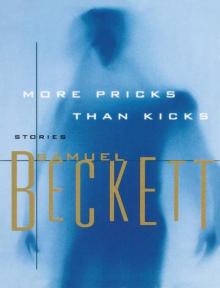 More Pricks Than Kicks
More Pricks Than Kicks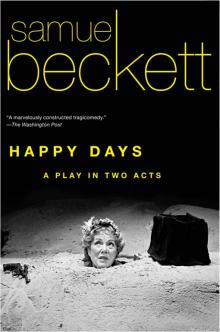 Happy Days
Happy Days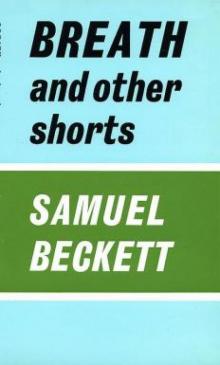 Breath, and Other Shorts
Breath, and Other Shorts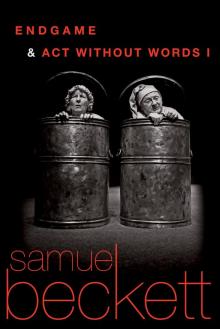 Endgame & Act Without Words
Endgame & Act Without Words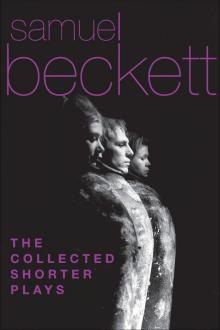 The Collected Shorter Plays of Samuel Beckett
The Collected Shorter Plays of Samuel Beckett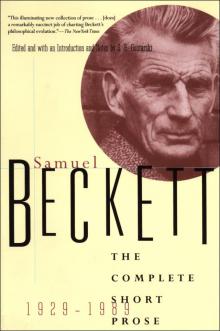 The Complete Short Prose, 1929-1989
The Complete Short Prose, 1929-1989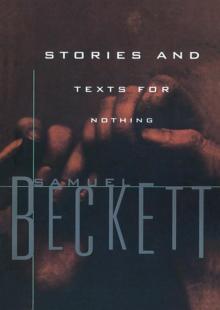 Stories and Texts for Nothing
Stories and Texts for Nothing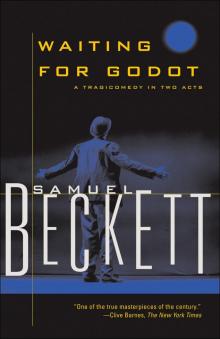 Waiting for Godot
Waiting for Godot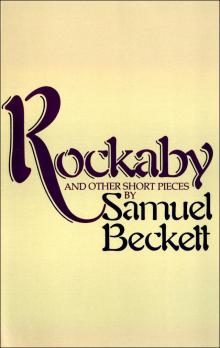 Rockaby and Other Short Pieces
Rockaby and Other Short Pieces First Love and Other Shorts
First Love and Other Shorts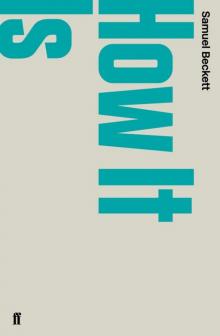 How It Is
How It Is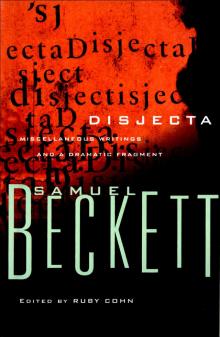 Disjecta: Miscellaneous Writings and a Dramatic Fragment
Disjecta: Miscellaneous Writings and a Dramatic Fragment Echo's Bones
Echo's Bones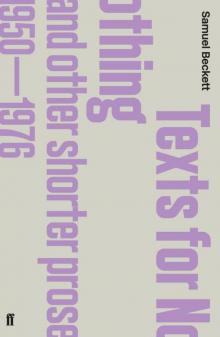 Texts for Nothing and Other Shorter Prose 1950-1976
Texts for Nothing and Other Shorter Prose 1950-1976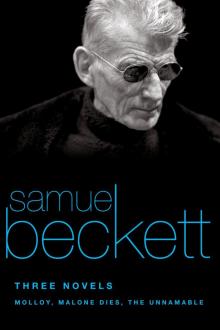 Three Novels
Three Novels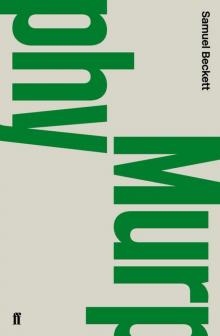 Murphy
Murphy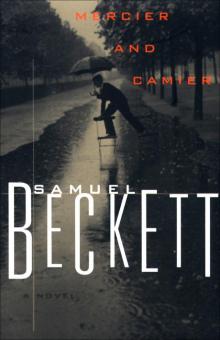 Mercier and Camier
Mercier and Camier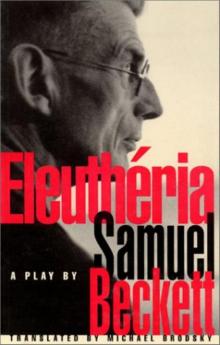 Eleuthéria
Eleuthéria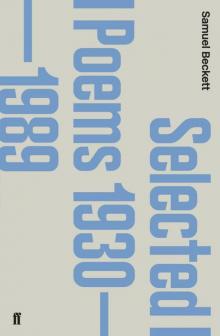 Selected Poems 1930-1988
Selected Poems 1930-1988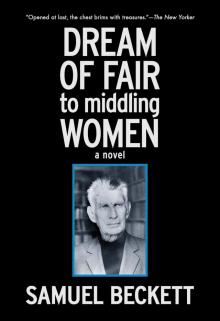 Dream of Fair to Middling Women
Dream of Fair to Middling Women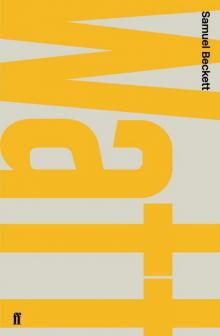 Watt
Watt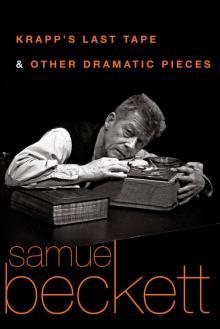 Krapp's Last Tape and Other Dramatic Pieces
Krapp's Last Tape and Other Dramatic Pieces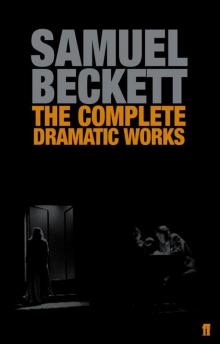 The Complete Dramatic Works of Samuel Beckett
The Complete Dramatic Works of Samuel Beckett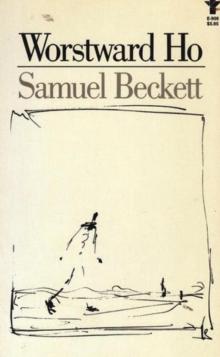 Worstward Ho
Worstward Ho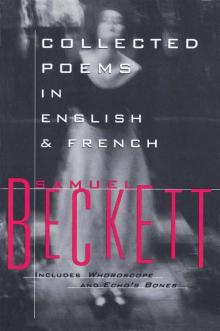 Collected Poems in English and French
Collected Poems in English and French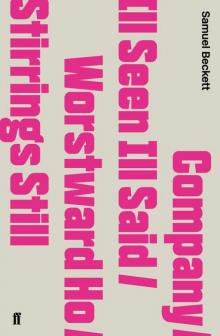 Company / Ill Seen Ill Said / Worstward Ho / Stirrings Still
Company / Ill Seen Ill Said / Worstward Ho / Stirrings Still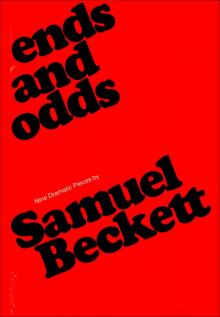 Ends and Odds
Ends and Odds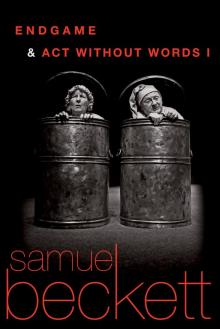 Endgame Act Without Words I
Endgame Act Without Words I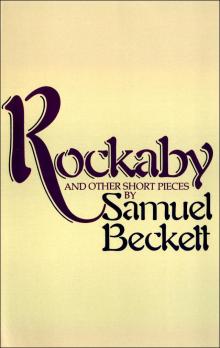 Rockabye and Other Short Pieces
Rockabye and Other Short Pieces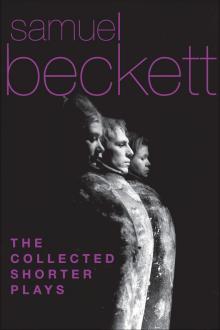 The Collected Shorter Plays
The Collected Shorter Plays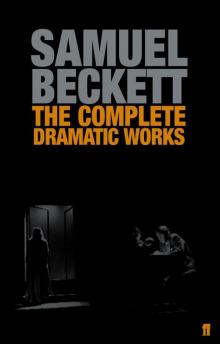 The Complete Dramatic Works
The Complete Dramatic Works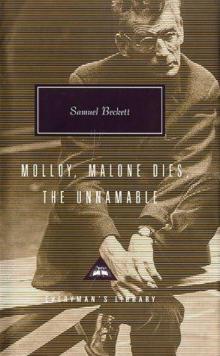 Three Novels: Malloy, Malone Dies, The Unnamable
Three Novels: Malloy, Malone Dies, The Unnamable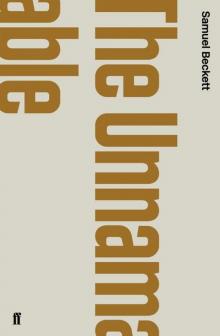 The Unnamable
The Unnamable